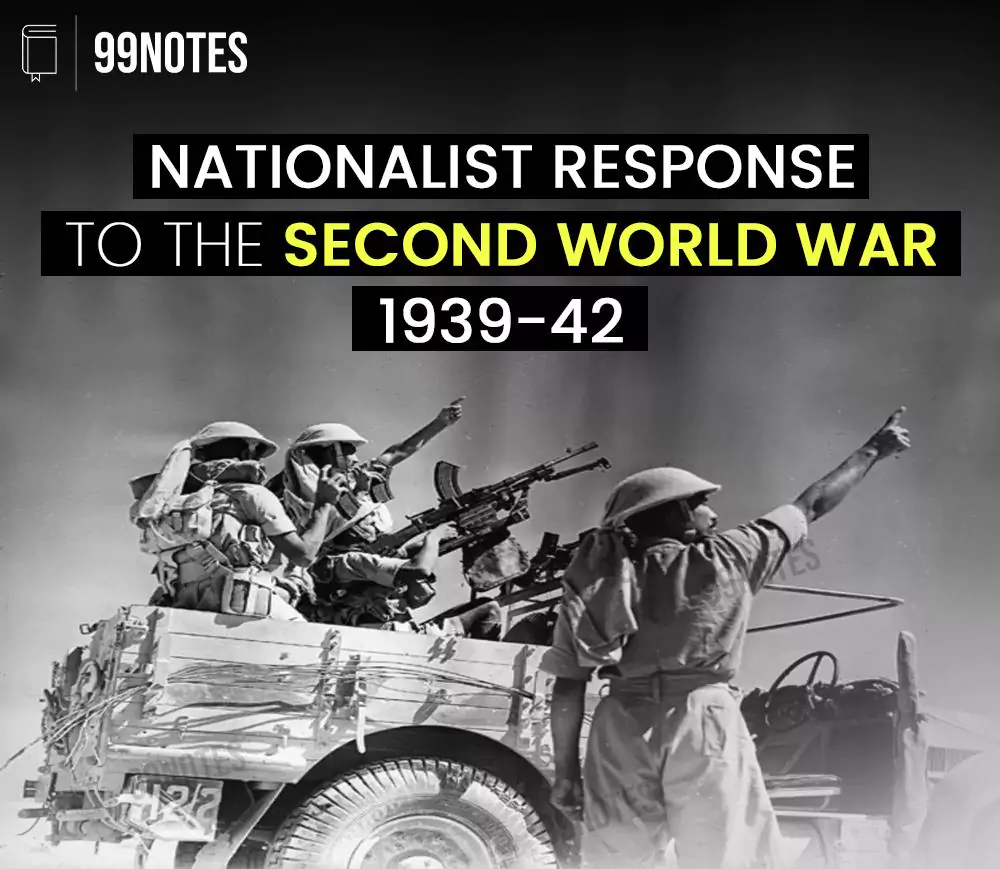NATIONALIST RESPONSE TO THE SECOND WORLD WAR (1939-42)
The Second World War
- The second world war broke out in September 1939 with the German invasion of Poland. Earlier, Germany had occupied Austria in 1938 and Czechoslovakia in 1939.
- Britain and France, which had been following a policy of appeasement towards Hitler, now came for Poland’s aid and declared war on Germany.
- The war was fought between two groups; the allied powers, which included Britain, France, Russia and the United States of America and the Axis powers, which included Germany, Italy and Japan.
- The British Indian government declared India’s support to the war without consulting with Congress or the central legislature.
Congress response and Wardha CWC meeting (September,1939)
- Congress, though unhappy with the government’s decision to unilaterally declare India’s support to the war, was sympathetic to the victims of the fascist aggressions.
- Its immediate reaction was to go to the aid of the anti-fascist alliance, provided a responsible government was established, and the future demands included a constituent assembly to frame the constitution of free India.
- Gandhi: Gandhi’s response was very emotional. He advocated unconditional cooperation with the British in their fight against fascist forces.
- Bose and other socialists: Subhash Chandra Bose, Acharya Narendra Dev and Jayaprakash Narayan, who were invited to attend the Wardha session, had no sympathy for either side of the war.
- They did not make a distinction between democracies and fascist forces and opined that both sides represented imperialism and were fighting for colonial possessions.
- They believed that the Congress should benefit from the situation and start the civil disobedience movement.
- Jawahar Lal Nehru: He took a unique position among all and sharply distinguished between democratic values and fascism.
- He believed in the just cause of Britain, France and Poland.
- However, he was clear in his position that Britain and France were imperial countries, and the war resulted from the inner contradictions of capitalism.
- Therefore, he argued that India should neither join the war till it is granted independence nor take advantage by starting an immediate struggle.
- CWC resolution: After Gandhi did not get support for his position, he decided to back Nehru’s position, which the Congress working committee then adopted.
- The resolution unequivocally condemned Nazism and Fascism, and the invasion of Poland. Still, it declared that India could not be a party to a war which was being fought for democratic freedom when India itself was denied freedom.
- If Britain is fighting the war for democracy and freedom, it should prove this in India.
- Britain should declare its war aims and how they would be implemented in India.
Government’s response and the resignation of the Congress ministries
- The government’s response was completely unfavourable. It tried to pit the Muslim League and the rulers of the princely states against the Congress and refused to specify Britain’s war aims beyond stating that Britain was just fending off aggression.
- As an immediate measure, the Viceroy Linlithgow offered to set up a consultative committee whose advice could be sought by the government whenever it felt necessary.
- The government promised that after the end of the war, it would enter into a consultation with communities, parties and interests in India and with the princely states regarding modifications in the Government of India Act 1935.
- It was clear that the government was not ready to either make any concessions immediately or make promises about the future. Instead, it tried to create difference among the Indians and branded the Congress as a purely Hindu organisation. The defence of India rules was promulgated to curb anti-government activities.
- The reaction of the Indian People: There was a sharp reaction from the Indians and the national leadership.
- The angriest reaction came from Gandhi: “The Indian declaration shows clearly that there is to be no democracy for India if Britain can prevent it”.
- On projecting the Congress as a Hindu organisation, Gandhi remarked, “The Congress will safeguard the rights of every minority so long they do not advance claims inconsistent with India’s independence”.
- The Congress working committee rejected the Viceroy’s statement as a reiteration of the old imperialist policy, decided not to support the war, and asked the provincial Congress ministries to resign in protest.
- However, the Congress leadership was still reluctant to give a call for an immediate and massive anti-imperialist struggle.
Debates on the Questions of immediate mass struggle
- After Viceroy Linlithgow’s statement, the debate started within the Congress on whether to launch a mass struggle.
- Gandhi and his supporters did not favour a mass struggle since they believed that the allied cause was just and the masses were not ready for a struggle.
- They were of the opinion that the Congress should instead focus on strengthening the organisation and continue negotiating with the government till all possibilities were exhausted; only then a mass struggle should be started.
- In a meeting in Allahabad in November 1939, the CWC resolution reiterated the imperialist nature of the war. It demanded that India’s independence and its right to frame a constitution should be recognised.
- In 1940, in the Rampur session of the Congress under Maulana Azad, while there was agreement that a struggle should be waged, there was no consensus on the form of struggle. The matter was left to Gandhi to decide the form and timing of the struggle.
Pakistan Resolution (1940) |
In March 1940, in its Lahore session, the Muslim league passed a resolution demanding:
|
- Even at this juncture, Gandhi favoured cooperation with the British. However, Nehru made it clear that complete independence must be the precondition for the Congress’s support of the British war effort. Bose was firm on his stand of taking advantage of the British situation.
- Finally, the Congress decided it would accept nothing short of complete independence and launch a civil disobedience movement as and when circumstances allow.






